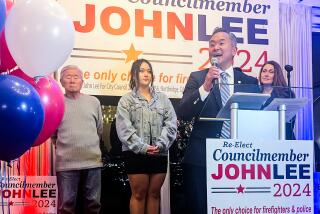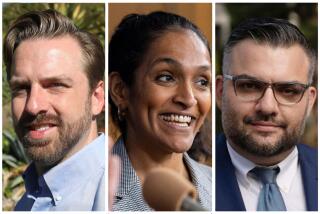Local Elections : Last-Minute Battle of Barbs Heats Up Quiet West Hollywood Council Race
In a departure from an otherwise low-key campaign, a war of words erupted last week between two of the five candidates who hope to win seats on the City Council when West Hollywood voters go to the polls Tuesday.
With incumbent Abbe Land favored to capture one of two at-large seats being contested, and with no dominant issue, the last week of campaigning was marked by bickering between rivals Paul Koretz and Ruth Williams, considered to be among the stronger challengers for a seat on the council.
The field of candidates also includes Steve Michael, the publisher of a twice-monthly community newspaper, who, like Williams, is making his third bid for the council, and political newcomer Teresa Garay, a community relations executive for a television station.
Mayor Alan Viterbi’s decision in January not to seek reelection to the council seat he has held since West Hollywood was incorporated in 1984 assures that the council will gain at least one new member as a result of the election.
The winners will serve for four years.
Koretz, a former aide to Viterbi, and Williams, a community activist, have sparred throughout the campaign.
Last month, Williams criticized Koretz for accepting $10,000 from the mayor’s defunct campaign committee at a time when Viterbi was several weeks late in disclosing the source of the funds, as required by state law. The mayor later complied.
But as the two challengers have stepped up their efforts to win the loyalty of renters--West Hollywood’s most significant voter constituency--their attacks have grown sharper.
In a mailing last week to 12,000 registered voters who are renters, Williams portrayed Koretz as the tool of landlords, big developers and special interest groups from outside West Hollywood, and assailed him as having “no record for working for renters’ rights.”
Koretz called the accusations “sleazy campaign tactics that have nothing to do with the truth” and countered with barbs of his own.
He accused Williams of being “the weakest vote” during her tenure on the Rent Stabilization Commission and of “changing her colors after running on a slate that was a front for landlords” in 1986, when she was endorsed by the pro-business group known as West Hollywood for Good Government.
“As for my campaign contributors, of the handful who could be considered developers, the record will show that the same people have contributed an equal or greater amount to Ruth Williams,” he said.
Meanwhile, Williams cried foul over a Koretz mailing that portrayed Koretz and Land, who were each endorsed by the Los Angeles County Democratic Party, as the only “official Democrats” in the race.
“That’s outright misrepresentation, since I’ve been endorsed by every Democratic club in West Hollywood and have the support of the only two West Hollywood residents who cast a vote for the county endorsement,” Williams said. “What does that make the groups that have endorsed me, chopped liver?”
While attacking each other, the other candidates generally have avoided criticizing Land, who enjoys the support of the powerful Coalition for Economic Survival, the tenants’ rights group instrumental in West Hollywood’s cityhood campaign four years ago.
Land, who won a special election in 1986 to fill the seat of ousted Councilwoman Valerie Terrigno, is an acknowledged favorite to win reelection. A former planning commissioner, she remains on the coalition’s 25-member steering committee, along with council members John Heilman and Helen Albert.
Although each of the challengers, except Michael, has sought the coalition’s endorsement, the group has given little indication that it is interested in endorsing anyone except Land.
To try to fill the void, Williams and Koretz each have sought to portray themselves as the most capable of protecting the interests of renters, who make up 87% of West Hollywood’s population.
Williams has emphasized that she has been a renter in West Hollywood for 20 years, stressing her past membership on the Rent Stabilization Commission and the coalition’s steering committee.
Although she fell out with the coalition in 1984, she tells voters that her commitment to rent control and tenants’ rights issues has never waned.
“I’ve lived in this city for 30 years. I’m no newcomer,” Williams said. “And I have a track record of fighting for cityhood, rent control, tenants rights and against overdevelopment, a record Paul Koretz does not have.”
For his part, Koretz says he helped draft parts of the city’s tough rent control law while serving as Viterbi’s deputy for3 1/2 years, and says he lobbied against anti-rent control legislation at the state level.
His campaign brochure mailed to renters includes a quote from Viterbi that says: “Paul rolled up his sleeves and worked tirelessly for rent control.” Also quoted is Los Angeles Councilman Zev Yaroslavsky, for whom Koretz once worked as a deputy: “Paul has stood up for renters since day one.”
Aside from the customary charges between the candidates, the campaign has generated perhaps the least interest of any in West Hollywood’s brief history.
“You have a popular candidate (Land) who is a heavy favorite, no outstanding issues, and essentially the others trying to come in second,” said Parke Skelton, Land’s campaign manager.
While Land and Koretz each have raised between $25,000 and $30,000, and Williams more than $20,000, the other candidates have had more difficulty raising money. As of last week, Michael had raised about $10,000, and Garay about $6,000.
With few exceptions, the campaign has failed to stir debate over issues, with each of the candidates pledging to work to control growth and solve the city’s traffic congestion problem, while offering few specifics.
Except for Michael, support for rent control has been a prominent part of each candidate’s campaign rhetoric.
Michael, a Republican, has accused the Los Angeles County Sheriff’s Department, which polices West Hollywood, of “insensitivity” to the problems of the city’s substantial homosexual community, and has called for an affirmative action policy to ensure the hiring of homosexual deputies.
His newspaper, West Hollywood USA, has often supported nightclub and restaurant owners at odds with neighborhood groups and the Sheriff’s Department, and is often critical of the city’s political establishment.
Virtually alone among the challengers in his criticism of Land, Michael has accused her of “talking out of both sides of her mouth on development,” and has assailed the coalition for its “dominance over the city’s political landscape.”
Garay, making her first bid for public office, co-chaired a citizens advisory group to the city’s general plan, and is also co-chairwoman of the Save Our Parks Alliance, a group that opposes the city’s plans to build a $25-million civic center in West Hollywood Park.
She has said that the city cannot afford to sacrifice precious green space for a civic center, and that the four council members, including Land, who approved the plan in January, did not give adequate consideration to alternative sites.
During a recent candidate forum when the civic center issue came up, Land defended her vote, saying that the council had considered 19 locations before selecting the park as the “the best and most appropriate one.”
“I wasn’t sold on the park in the beginning, but I believe it to be the best and most appropriate site,” she said.
Land said that her door-to-door canvassing had convinced her that voters were more concerned with protecting rent control and limiting excessive growth than in where the civic center is built.
More to Read
Sign up for Essential California
The most important California stories and recommendations in your inbox every morning.
You may occasionally receive promotional content from the Los Angeles Times.










